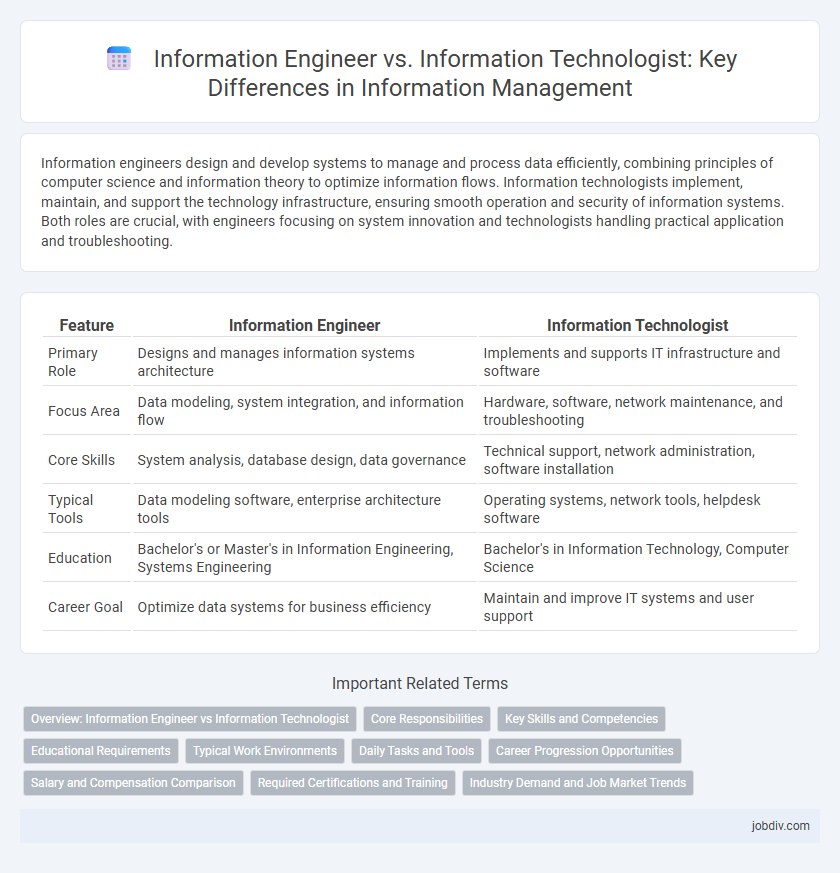Information engineers design and develop systems to manage and process data efficiently, combining principles of computer science and information theory to optimize information flows. Information technologists implement, maintain, and support the technology infrastructure, ensuring smooth operation and security of information systems. Both roles are crucial, with engineers focusing on system innovation and technologists handling practical application and troubleshooting.
Table of Comparison
| Feature | Information Engineer | Information Technologist |
|---|---|---|
| Primary Role | Designs and manages information systems architecture | Implements and supports IT infrastructure and software |
| Focus Area | Data modeling, system integration, and information flow | Hardware, software, network maintenance, and troubleshooting |
| Core Skills | System analysis, database design, data governance | Technical support, network administration, software installation |
| Typical Tools | Data modeling software, enterprise architecture tools | Operating systems, network tools, helpdesk software |
| Education | Bachelor's or Master's in Information Engineering, Systems Engineering | Bachelor's in Information Technology, Computer Science |
| Career Goal | Optimize data systems for business efficiency | Maintain and improve IT systems and user support |
Overview: Information Engineer vs Information Technologist
Information Engineers focus on designing and optimizing information systems through the application of engineering principles and data modeling techniques to improve data flow and system efficiency. Information Technologists specialize in implementing, maintaining, and managing IT infrastructure, networks, and software applications to support organizational technology needs. Both roles require strong technical skills, but Information Engineers emphasize system design and architecture, while Information Technologists prioritize operational technology management.
Core Responsibilities
Information Engineers design and develop data systems, focusing on data modeling, integration, and optimization to ensure efficient information flow and storage. Information Technologists manage and maintain IT infrastructure, including networks, hardware, and software, to support organizational technology needs. Both roles prioritize data accuracy and system reliability, but Information Engineers emphasize system architecture, while Information Technologists concentrate on operational support.
Key Skills and Competencies
Information Engineers specialize in designing and managing data architecture, requiring strong skills in systems analysis, database design, and software development. Information Technologists focus on implementing and maintaining IT infrastructure, emphasizing competencies in network management, cybersecurity, and technical support. Both roles demand proficiency in information systems, but engineers prioritize system optimization and integration while technologists excel in operational management and troubleshooting.
Educational Requirements
Information Engineers typically require a bachelor's degree in information engineering, computer science, or software engineering, emphasizing skills in systems design, data algorithms, and software development. Information Technologists often hold degrees in information technology, computer science, or management information systems, focusing more on network administration, database management, and IT infrastructure. Both career paths may benefit from certifications like Cisco's CCNA for technologists and Certified Information Systems Security Professional (CISSP) for engineers to enhance specialized knowledge.
Typical Work Environments
Information Engineers typically work in environments such as software development firms, telecommunications companies, and industrial automation industries where they design and optimize information systems and infrastructure. Information Technologists are commonly found in corporate IT departments, data centers, and managed service providers, focusing on maintaining and supporting computer networks, hardware, and software applications. Both roles often operate in collaborative office settings but differ in the technical focus and organizational context of their daily responsibilities.
Daily Tasks and Tools
Information Engineers design and develop data systems, focusing on database architecture, data modeling, and system integration using tools like SQL, ERwin, and data warehousing platforms. Information Technologists manage and maintain IT infrastructure, including network administration, hardware troubleshooting, and software deployment, utilizing tools such as Windows Server, VMware, and Cisco networking equipment. Both roles emphasize data management but differ as Engineers concentrate on system design, whereas Technologists focus on operational support.
Career Progression Opportunities
Information Engineers specialize in designing and optimizing complex information systems, often advancing towards roles like Systems Architect, Data Scientist, or IT Project Manager. Information Technologists focus on implementing and maintaining technology infrastructures, progressing into positions such as Network Administrator, IT Manager, or Cybersecurity Specialist. Career growth in both fields depends on continuous skill development, certifications, and adapting to emerging technologies like cloud computing and artificial intelligence.
Salary and Compensation Comparison
Information Engineers typically command higher salaries due to specialized skills in system design and data architecture, with average annual compensation ranging from $85,000 to $120,000. Information Technologists often earn between $65,000 and $95,000, reflecting roles centered on IT support, network management, and system maintenance. Salary variations depend on factors such as experience, certifications, industry, and geographic location.
Required Certifications and Training
Information Engineers typically require certifications such as Certified Information Systems Security Professional (CISSP), Certified Data Management Professional (CDMP), and relevant engineering degrees focused on data architecture and systems integration. Information Technologists often pursue certifications like CompTIA A+, Network+, Microsoft Certified Solutions Expert (MCSE), and Cisco Certified Network Associate (CCNA) to validate their skills in IT infrastructure, network management, and technical support. Both roles benefit from continuous training and professional development in emerging technologies, but Information Engineers emphasize advanced analytical and design skills, whereas Information Technologists focus more on practical implementation and maintenance of IT systems.
Industry Demand and Job Market Trends
Information Engineers are in high demand for their expertise in designing and optimizing data systems, addressing complex information flow in industries such as telecommunications, finance, and manufacturing. Information Technologists focus on implementing and managing IT infrastructure, with strong market growth driven by cloud computing, cybersecurity, and digital transformation initiatives. Industry trends indicate a rising need for hybrid skills combining engineering principles with technology management to meet evolving digital demands.
Information Engineer vs Information Technologist Infographic

 jobdiv.com
jobdiv.com